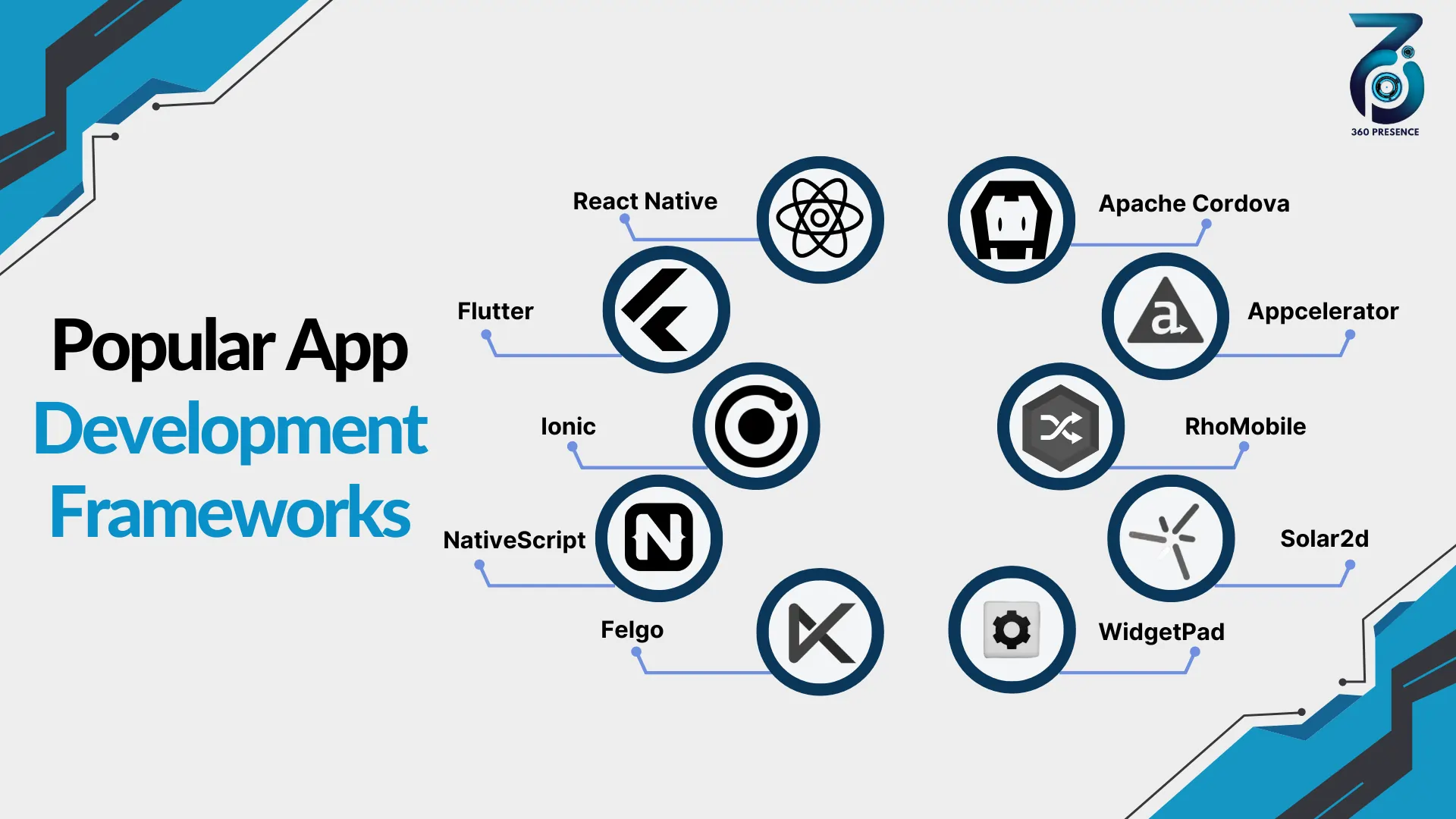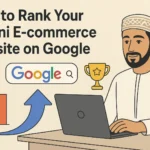Top App Development Trends In Oman For 2025

App Development Trends In Oman
Tech is booming in Oman, and apps are leading the charge! From AI-powered services to government-backed digital platforms, App Development Trends in Oman for 2025 are all about smarter, faster, and more intuitive mobile experiences. Whether you’re a developer, entrepreneur, or tech enthusiast, these innovations are set to transform how you live, work, and connect in the Sultanate.
In this blog, we’ll explore the latest frameworks, must-have features, and the exciting ways Oman’s Vision 2040 is influencing the future of mobile apps. Spoiler alert: It’s a game-changer!
So, ready to geek out? Let’s dive into the biggest App Development Trends in Oman!
Government Initiatives Supporting App Development in Oman
Oman’s government has been actively fostering a tech-friendly ecosystem to accelerate digital transformation and innovation in app development. Several key initiatives are empowering startups, developers, and businesses to thrive in the mobile app space:
1. Oman Vision 2040 – A Digital-First Strategy
Focus Areas:
Smart Government Services: Encouraging app-based solutions for e-governance (e.g., Omanuna app for citizen services).
Entrepreneurship & Innovation: Supporting tech startups through funding, incubators, and regulatory reforms.
Digital Infrastructure: Expanding 5G networks, cloud computing, and cybersecurity to enable advanced mobile apps.
Impact on App Development:
Increased demand for AI, IoT, and blockchain-powered apps in sectors like healthcare, logistics, and finance.
Government tenders and partnerships for local app developers to build public-sector solutions.
2. Invest Easy Portal – Simplifying Business for Tech Startups
What It Offers:
A one-stop digital platform for company registration, licensing, and investor services.
Fast-track approvals for tech and IT startups (reducing setup time from weeks to days).
Benefits for App Developers:
Easier access to funding, visas for tech talent, and tax incentives.
Encourages foreign tech firms to establish local offices, boosting Oman’s app economy.
3. Oman Technology Fund (OTF) – Fueling Fintech & AI Startups
Key Programs:
Fintech Accelerator: Supports mobile payment, blockchain, and digital banking apps.
AI & IoT Grants: Funds R&D for smart city apps, automation, and machine learning.
Success Stories:
Startups like Thawani (payment gateway) and Akeed (delivery app) have benefited from OTF funding.
4. National Program for Artificial Intelligence (AI)
Goals:
Integrate AI-powered apps in healthcare, education, and logistics.
Train Omani developers in AI/ML frameworks like TensorFlow and PyTorch.
App Development Impact:
Rise of chatbots, predictive analytics, and voice-enabled apps in Arabic.
App Development Frameworks: Empowering Development
Explore cutting-edge app development frameworks transforming Oman’s digital landscape in 2025. From JavaScript-based React Native to low-code WidgetPad and enterprise-ready Xamarin, these tools empower developers to build faster, smarter, and more scalable mobile solutions across industries.
1. React Native
A framework from Facebook that allows developers to build native mobile apps using JavaScript and the React library.
With a large and active community, React Native is a popular choice in Oman for businesses that want to leverage their existing JavaScript expertise to build mobile applications. Its ability to create truly native UI components results in a smooth and responsive user experience, making it suitable for a wide range of applications, including social networking, e-commerce, and utility apps.
2. Flutter
A UI toolkit enabling the creation of natively compiled applications for mobile, web, and desktop from a single codebase, known for its speed and expressive UI.
Flutter’s rapid development capabilities and visually appealing interfaces have made it a favorite among developers in Oman. Businesses across various sectors, from retail to education, are leveraging Flutter to build engaging and high-performance cross-platform apps that deliver a consistent user experience on both iOS and Android. Its “hot reload” feature significantly speeds up the development and testing process.
3. Ionic
An open-source UI toolkit specifically designed for building high-quality, cross-platform hybrid and Progressive Web Apps using web technologies.
Ionic’s focus on web standards and its rich library of UI components make it a go-to framework for developers in Oman building hybrid apps and PWAs. Its compatibility with popular web frameworks like Angular, React, and Vue.js provides flexibility and allows web developers to transition smoothly to mobile app development.
4. NativeScript
An open-source framework for building natively rendered mobile applications using JavaScript, TypeScript, or Angular.
NativeScript differentiates itself by compiling web code directly into native UI components, resulting in true native performance without the need to learn platform-specific languages like Swift or Kotlin. This makes it an attractive option for web developers in Oman who want to build high-performance mobile apps.
5. Felgo
A cross-platform framework built on Qt, particularly well-suited for developing visually rich and interactive applications, including games.
As the demand for engaging and visually appealing mobile experiences grows in Oman, Felgo capabilities in creating fluid UIS and high-performance games are becoming increasingly relevant. Its focus on multimedia and animation makes it a strong choice for entertainment and educational applications.
6. Mobile Angular UI
An open-source framework that extends the popular Angular framework to provide mobile-specific UI components and functionalities.
For development teams in Oman with expertise in Angular, Mobile Angular UI offers a familiar and structured approach to building mobile applications. It streamlines the development process by providing responsive design principles and mobile-ready components.
For development teams familiar with Angular, Mobile Angular UI can streamline the creation of mobile applications with a consistent architectural approach.
7. Apache Cordova
Leverage existing web development expertise (HTML, CSS, JavaScript) to create cross-platform mobile applications.
Apache Cordova has gained traction in Oman for businesses seeking to enter the mobile space efficiently. By allowing developers to utilise their familiar web technologies, Cordova significantly reduces the learning curve and can accelerate the development process. For businesses needing informational apps, internal tools, or initial market validation across both ios and Android without a massive upfront investment in platform-specific development, Cordova offers a viable solution. We’re seeing increased adoption in sectors like tourism and local services where broad accessibility is paramount.
8. RhoMobile
A framework tailored for building enterprise-grade mobile applications, particularly for ruggedised devices common in industrial and field operations within Oman.
RhoMobile’s strength lies in its ability to create reliable and secure applications for specific business needs, often involving data capture, inventory management, and field service operations. In Oman’s growing logistics, oil and gas, and construction sectors, RhoMobile is proving invaluable for equipping field teams with powerful and durable mobile solutions that can withstand demanding environments.
9. Solar2d
A free and open-source framework ideal for developing engaging 2D games and interactive applications using the Lua scripting language.
Oman’s growing interest in digital entertainment and educational resources is driving the adoption of frameworks like Solar2d. Its ease of use and rapid iteration capabilities make it a popular choice for independent developers and educational institutions looking to create compelling and interactive mobile experiences. We’re seeing a rise in locally developed mobile games and educational apps leveraging Solar2d’s capabilities.
10. Xamarin
A framework from Microsoft that enables developers to build cross-platform mobile apps with C# and the .net Framework.
For businesses and developers in Oman already invested in the Microsoft ecosystem, Xamarin offers a seamless way to create ios and Android applications using their existing C# skills. It provides good performance and access to native APIS, making it a strong contender for enterprise-level mobile solutions.

A Look into Oman Tech Transformation
AI & Machine Learning Integration
AI and machine learning are transforming apps in Oman. Businesses are using AI-powered chatbots to handle customer service in sectors like banking and e-commerce. Apps are now offering personalized product and content recommendations in retail and entertainment. In healthcare and logistics, predictive analytics help forecast demand, manage inventory, and improve user experiences by anticipating behavior and trends based on data patterns.
Blockchain for Security & Transparency
Blockchain technology is increasingly used in Oman to boost app security and transparency. Digital identity verification using blockchain is gaining traction in banking and government apps, helping reduce fraud. Smart contracts are revolutionizing real estate and legal platforms by automating agreements and ensuring secure, tamper-proof transactions. This trust-based infrastructure is ideal for apps that deal with sensitive or high-value data.
Super Apps (All-in-One Solutions)
Super apps are gaining popularity in Oman, mirroring the trend across GCC countries. These apps combine multiple services—like payments, e-commerce, and public utilities—within one interface, simplifying digital life for users. For example, Oman’s “Omanuna” serves as a digital hub for accessing a wide range of government services. This trend supports convenience, data integration, and a more cohesive user experience across sectors.
Voice & Arabic NLP
The demand for voice-enabled apps is growing, especially with support for Arabic language processing. Users in Oman are increasingly using voice search and commands for tasks like setting reminders, finding local services, or navigating apps. Apps integrated with smart assistants like Siri or Google Assistant are being customized for Arabic-speaking audiences, making them more accessible and intuitive for regional users.
Sustainability & Green Tech Apps
Sustainability is influencing app development, with a focus on green technologies in Oman. Apps are emerging that help users track energy usage, manage waste, and support eco-tourism. These applications promote awareness and encourage users to adopt environmentally friendly practices. Businesses are also integrating carbon tracking and sustainable logistics features to align with Oman’s Vision 2040 for a greener future.
Hyperlocal & On-Demand Services
Hyperlocal apps are booming in Oman, catering to users’ instant needs. Services like Talabat and Otlob offer fast food delivery, while Otaxi provides convenient ride-hailing. Apps also cover home cleaning, repairs, and grocery delivery. These platforms thrive on real-time logistics, GPS tracking, and easy payment integration—offering comfort, speed, and localized convenience tailored to busy urban lifestyles.
Low-Code/No-Code Development
To meet the rising demand for digital solutions, businesses in Oman are embracing low-code and no-code platforms like Bubble and Adalo. These tools allow quick app creation without advanced coding knowledge, ideal for SMEs and startups. This trend speeds up development cycles, reduces costs, and encourages innovation by empowering entrepreneurs and teams to build and scale applications with minimal technical barriers.
Types of Mobile Applications in Oman
The type of application a business chooses to develop significantly impacts its functionality, performance, and reach within the Omani market:
1. Native Apps
Applications built specifically for either the ios or Android operating system using their native programming languages (Swift/Objective-C for iOS, Kotlin/Java for Android).
Native apps continue to be the gold standard for applications demanding the highest levels of performance, responsiveness, and access to the full spectrum of device features. In Oman, sectors like banking, government services requiring secure authentication, and high-performance gaming are heavily invested in native app development to provide users with a seamless and reliable experience. While requiring platform-specific development, the superior user experience often justifies the investment for critical applications.
2. Web Native Apps
Websites are enhanced with modern web technologies to offer a near-native app experience directly through the browser.
PWAs are gaining significant traction in Oman due to their inherent advantages in terms of discoverability (no app store download required), ease of sharing (via URL), and rapid deployment. For e-commerce businesses, news portals, and service providers in Oman looking to reach a broad audience with a streamlined user experience, PWAs offer a compelling alternative or complement to native apps. Their ability to work offline and send push notifications further enhances user engagement.
3. Hybrid Apps
Applications built using web technologies (HTML, CSS, JavaScript) and wrapped within a native container to run on mobile devices. Frameworks like Apache Cordova and Ionic are key enablers.
Hybrid apps represent a strategic compromise, allowing businesses in Oman to achieve cross-platform compatibility with a potentially faster development timeline and lower cost compared to developing separate native apps. They offer access to device features through plugins and are suitable for a wide range of applications, from informational portals to e-commerce storefronts. The increasing maturity of hybrid frameworks is leading to improved performance and a more native-like feel, making them an attractive option for many businesses in the Omani market.

Conclusion
The app development landscape in Oman for 2025 is characterised by a dynamic interplay of established technologies and emerging trends. By understanding the strengths and use cases of various development languages, strategically choosing the right type of application for their needs, and leveraging the power of modern frameworks, businesses and entrepreneurs in Oman can create impactful mobile solutions that resonate with their target audience.
Staying informed about these top trends is not just about keeping up; it’s about unlocking new opportunities, enhancing customer engagement, and driving digital innovation within the Sultanate’s rapidly evolving digital economy. As 2025 progresses, those who embrace these advancements will be best positioned to thrive in Oman’s increasingly mobile-first world.
Partner With Naumaan Oman
Search
Recent Posts
Working Together Ideas come to life
No matter how big your company is, as you expand and reach new highs you’ll want an agency to have your back. One with a process
360presence@gmail.com

© 2023 360PRESENCE All rights Reserved
















